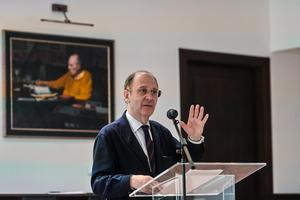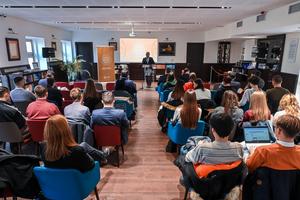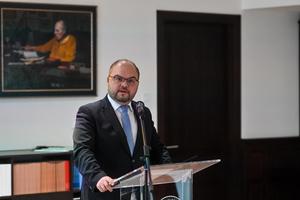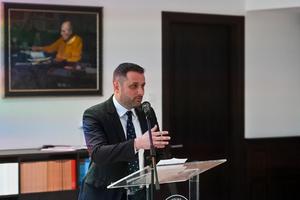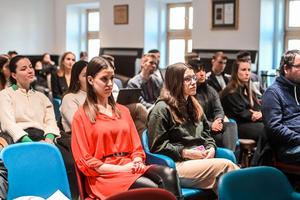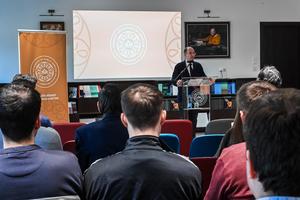On the 9th of February 2023, in the John Lukacs Lounge of the Side Building, Miguel Ayuso Torres, professor of constitutional law at the Pontifical University of Comillas in Madrid, gave a lecture on the philosophical foundations of jurisprudence and constitutional law organized by the Eötvös József Research Center of the Ludovika-University of Public Service (UPS).
Bernát Török, host of the event described the speaker - a personal friend of the intellectual historian Tamás Molnár - as not only a theoretician, but also an intellectual who regularly shares his thoughts with the wider community, and also someone who takes an active professional and public role as the main organizer of the International Association of Catholic Lawyers. The director of the EJKK said that nowadays the questions that the professor is researching are causing increasingly loud debates on the continent: what is the role of tradition in law; what a plural society is like; what values should be protected in the constitution. The common language of compromise seems to be disappearing here, as in so many other areas. In 2023, the Research Center will invite a number of foreign speakers to promote the university's campus to host an exciting intellectual life.
Ákos Mernyei, the international director of UPS, emphasized in his greeting that we are discussing these issues of jurisprudence at the best possible moment. The basis of Europe is the Judeo-Christian tradition and Roman law. Even today, Hungary bases its modern legal system on Christian culture, as there is no contradiction between innovation and preserving traditions. The director also said that the university considers the identity-forming power of Christian culture important and teaches its students in this spirit.
Miguel Ayuso Torres began his lecture on Traditions and Pluralism in Public Law by saying that constitutional law cannot be understood without a thorough knowledge of modernity. According to classical, ancient philosophy, man is a zoon politikon, i.e. a social being. The professor of constitutional law at the Pontifical University of Comillas in Madrid said that the characteristic of modernity on the other hand is, that it can only think in terms of the individual separated from God and the community. The main constitutional instrument of modernity is the social contract, which was born at the end of a devastating war. The philosophy of modernity - Hobbes, Locke, and Rousseau - stripped man down to his fear of death, his desire for possessions, and his need for freedom from the ruler. Respect for the letter came before the phenomena of the real world - and with this, the law went beyond reality and entered the service of ideology.
Text: Tibor Sarnyai
Photo:Dénes Szilágyi
